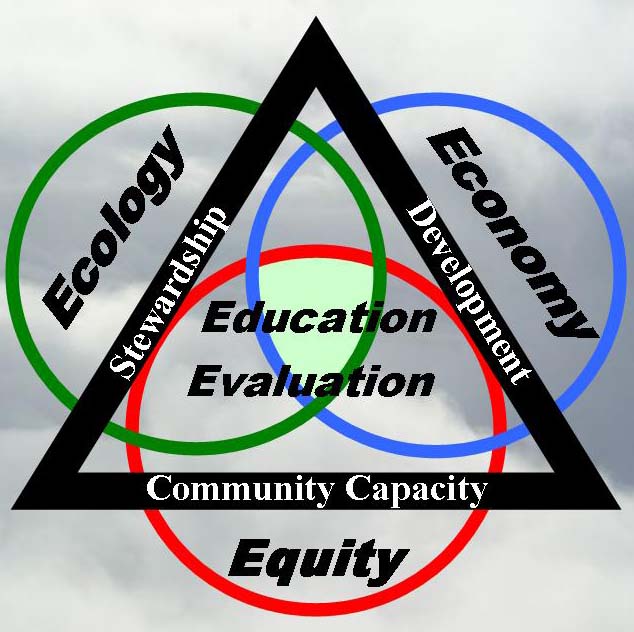| The
Firm's Owner and Principal Consultant
R.
Warren Flint is Principal of Five E’s
Unlimited in Napa, CA. As a sustainability
professional, natural scientist, public participation practitioner,
conflict mediator, and ecologist Flint assists regions
in creating authentic choices and providing effective responses
to environmental degradation, economic decline, and community
disintegration through scientific inquiry and consensus
building. Warren provides international leadership in developing
research, management, policy protocol, public inquiry,
and education strategies toward achieving sustainable development
goals, as defined by governments, corporations, academic
institutions, communities, and non-governmental organizations.
He encourages looking beyond solving problems one at a
time, to a position where one can envision the development
of systems that prevent problems from occurring in the
first place. Through his project design and leadership,
he encourages shared relationships among ecologic, social
justice, and economic development interests. Dr. Flint's
complete curriculum vitae can be found here.
Warren is an internationally-recognized
expert
on sustainable development whose advice is regularly
sought
and who has worked on the theoretical foundations and
practical applications of sustainability in many different
global contexts. He has initiated and directed interdisciplinary
research
and public consensus-building targeted at contemporary
and emerging natural resource and economic development
issues. He has provided leadership for many Projects focused
upon multiple discipline, international inquiries into
scientific, technological, and societal problems related
to the management and remediation of large ecosystems.
Flint has also served on many local, state, federal, and
international scientific, technical, and advisory committees,
boards, and task forces whose mandates were enhanced economic
development in line with sound protection and conservation
of natural resources and remediation of environmental quality.
Flint obtained
his Ph.D. in Ecology in 1975 from the University of
California at Davis. He
possesses an M.S. in Marine
Science from Long Island University (1971) and a B.S. in
Biology from Canisius College in Buffalo, NY (1968). He
held research and
administrative posts at several large
universities through his 25 year academic career. Overall,
Warren possesses a unique set of skills because he is able
to ground his community facilitation and conflict mediation
talent in 33 years of content expertise as an environmental
scientist and sustainability specialist. Since leaving
academia his 12 years of consulting work in sustainable
development, adaptive watershed and coastal zone management,
education, and urban revitalization have equipped him with
a wealth of experience in collaborative fact-finding programs,
providing visionary inspiration and pragmatic, science-based
understanding to problem-solving, community development,
and strategic planning. Warren enables clients to integrate
self-defined community and business goals with environmentally
sound decisions. He is a trained facilitator (Institute
for Cultural Affairs) accomplished in many public participation
methodologies, a certified mediator in Environmental Conflict
Resolution (U.S. Institute for Environmental Conflict Resolution – USIECR;
Tucson, AZ), has served on the USIECR mediation roster
for 9 years, and has worked as an effective community planner
and stakeholder interviewer. He has conducted more than
1,000 hours of public participation and conflict resolution
activities over the last 5 years.
His internationally
recognized work in sustainable community development
is centered on promoting
sustainable community
improvements and resiliency by working with groups to seek
common ground solutions in their integration of economic,
environmental,
and social equity concerns. For example, his project design
and leadership in directing strategic sustainability planning
in 2007 for Dauphin
Island, AL (USA),
after the destructive forces of two hurricanes, is notable.
This work resulted in Flint developing a perspective on “Seeking
Resiliency in the Development of Sustainable Communities” that
he has made presentations on around the U.S. He has also
assumed leadership roles in revitalization of urban
neighborhoods in Buffalo, NY, New Orleans, LA, and Washington,
DC. He works with citizen groups to design and implement
comprehensive strategies for rebuilding communities, while
at the same time empowering people to take control of their
own destiny.
In his university
work Warren developed a dedication to the interdisciplinary
application of
knowledge learned
from science toward real world environmental resource problems,
land-use issues, and corresponding economic development.
He has taught university courses in environmental science,
marine biology, and ecology, and conducted research in
estuarine ecology, coastal oceanography, freshwater ecosystem
science, aquatic resource conservation/restoration, and
areas of community-based sustainability. Flint has also
devoted many years to the innovative development and application
of interdisciplinary environmental studies education through
the adoption of "ecology across the curriculum" strategies
in support of both formal and informal education processes
in sustainable development. More recently he has actively
contributed to interdisciplinary program development in
sustainability education, through his work on Sustainability
Education Competencies,
and taught two courses (2007-08) for the Bainbridge Graduate
Institute (MBA Program, Bainbridge Island, WA): “Sustainable
Community Economic Development: Design, Tools, and Practices” and “Introduction
to Sustainability in Business.” Warren also taught
a course, “Integrative Environmental Science” (2007),
for the Center for Community Change Master’s Degree
program at Antioch University, Seattle.
Dr. Flint's Publication
List includes more than 60 peer reviewed journal articles,
monographs,
book chapters, and books on his research and community
development work, including a book in 2001 entitled "Living
a Sustainable Lifestyle for Our Children's Children" that
captures much of his understanding regarding sustainability
as it relates to the average citizen. He also published
an on-line, Internet newsletter entitled "Sustainability
Review", subscribed to by more than 3,000 persons
from 90 different countries around the world.
|

